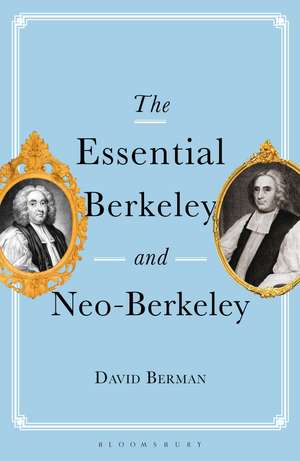The Essential Berkeley and Neo-Berkeley
Autor Professor David Bermanen Limba Engleză Paperback – 9 feb 2022
| Toate formatele și edițiile | Preț | Express |
|---|---|---|
| Paperback (1) | 132.04 lei 3-5 săpt. | +39.69 lei 6-12 zile |
| Bloomsbury Publishing – 9 feb 2022 | 132.04 lei 3-5 săpt. | +39.69 lei 6-12 zile |
| Hardback (1) | 404.12 lei 6-8 săpt. | |
| Bloomsbury Publishing – 23 mar 2022 | 404.12 lei 6-8 săpt. |
Preț: 132.04 lei
Preț vechi: 162.58 lei
-19% Nou
Puncte Express: 198
Preț estimativ în valută:
25.27€ • 26.28$ • 21.15£
25.27€ • 26.28$ • 21.15£
Carte disponibilă
Livrare economică 21 februarie-07 martie
Livrare express 06-12 februarie pentru 49.68 lei
Preluare comenzi: 021 569.72.76
Specificații
ISBN-13: 9781350214729
ISBN-10: 1350214728
Pagini: 216
Dimensiuni: 129 x 198 x 19 mm
Greutate: 0.24 kg
Editura: Bloomsbury Publishing
Colecția Bloomsbury Academic
Locul publicării:London, United Kingdom
ISBN-10: 1350214728
Pagini: 216
Dimensiuni: 129 x 198 x 19 mm
Greutate: 0.24 kg
Editura: Bloomsbury Publishing
Colecția Bloomsbury Academic
Locul publicării:London, United Kingdom
Caracteristici
The work of George Berkeley is having something of a renaissance in contemporary scholarship. A big theme of this book is Berkeley's continued relevance
Notă biografică
David Berman is Professor Emeritus Fellow in the Philosophy Department, Trinity College Dublin, Ireland. He is author of A History of Atheism in Britain: From Hobbes to Russell (2013), Berkeley and Irish Philosophy (Bloomsbury, 2005), Berkeley: The Great Philosophers (2008), Images of Berkeley (1986) and editor of George Berkeley (Routledge Revivals): Eighteenth-Century Responses: Volumes 1&2 (2020)
Cuprins
PrefaceAbbreviations Part 1: Berkeley's PhilosophySection 1: Overview and SummarySection 2: Berkeley's life and worksSection 3: The structure of Berkeley's PrinciplesSection 4: Berkeley's dualism and dualistic experienceSection 5: Dualism or monism?Section 6: The phenomenalistic interpretation Section 7: OverviewSection 8: Hume's PhenomenalismSection 9: the cdeSection 10: Alciphron, the TVV and DHP 1734Section 11: James Hill on the notionalSection 12: The 2 or 3 Advantages of the Section 27 doctrineSection 13: What underpins the notionalSection 14: The big historical pictureSection 15: Berkeley on objects: the revisionSection 16: Berkeley's Siris Part 2: Neo-BerkeleySection 1: Berkeley in 1752-3Section 2: The DMT: Why it hasn't been acceptedSection 3: Berkeley's Immaterialism and Monotheistic GodSection 4: Neo-B on God and other dualistic mindsSection 5: God and theistic intimacy and dualistic intimacy Section 6: Dualistic Intimacy: Montaigne and La BoeteSection 7: The Tactual Visual Typology Notes Bibliography Index
Recenzii
Short, clear and very readable ... The Berkeleyan scholarship is impeccable, but provocative.
David Berman creates and develops a dialectical confrontation between Berkeley and himself as Neo-Berkeley. His philosophical target is Berkeley's dualism and its important implications to modern epistemology. His account is truly innovative: no one has approached Berkeley's grand theory from a similar constructive perspective.
David Berman provides us with a penetrating and highly original assessment of Berkeley's philosophical legacy.
In his brief but challenging book, David Berman offers a novel account of the basis of Berkeleanism, resting it on his dualism. Even more challenging, the second half of Berman's book lays out what can be saved if we accept Berkeley's dualism and reject his idealism. A must read!
David Berman creates and develops a dialectical confrontation between Berkeley and himself as Neo-Berkeley. His philosophical target is Berkeley's dualism and its important implications to modern epistemology. His account is truly innovative: no one has approached Berkeley's grand theory from a similar constructive perspective.
David Berman provides us with a penetrating and highly original assessment of Berkeley's philosophical legacy.
In his brief but challenging book, David Berman offers a novel account of the basis of Berkeleanism, resting it on his dualism. Even more challenging, the second half of Berman's book lays out what can be saved if we accept Berkeley's dualism and reject his idealism. A must read!
